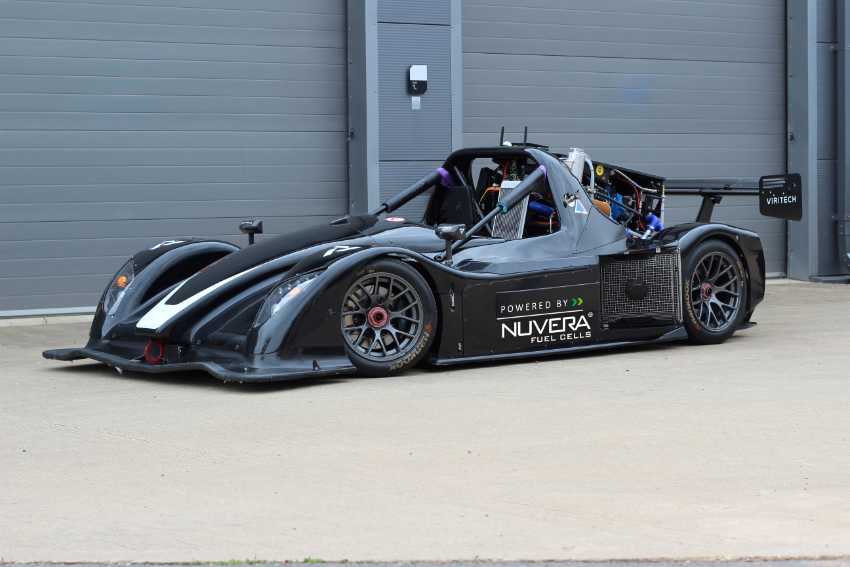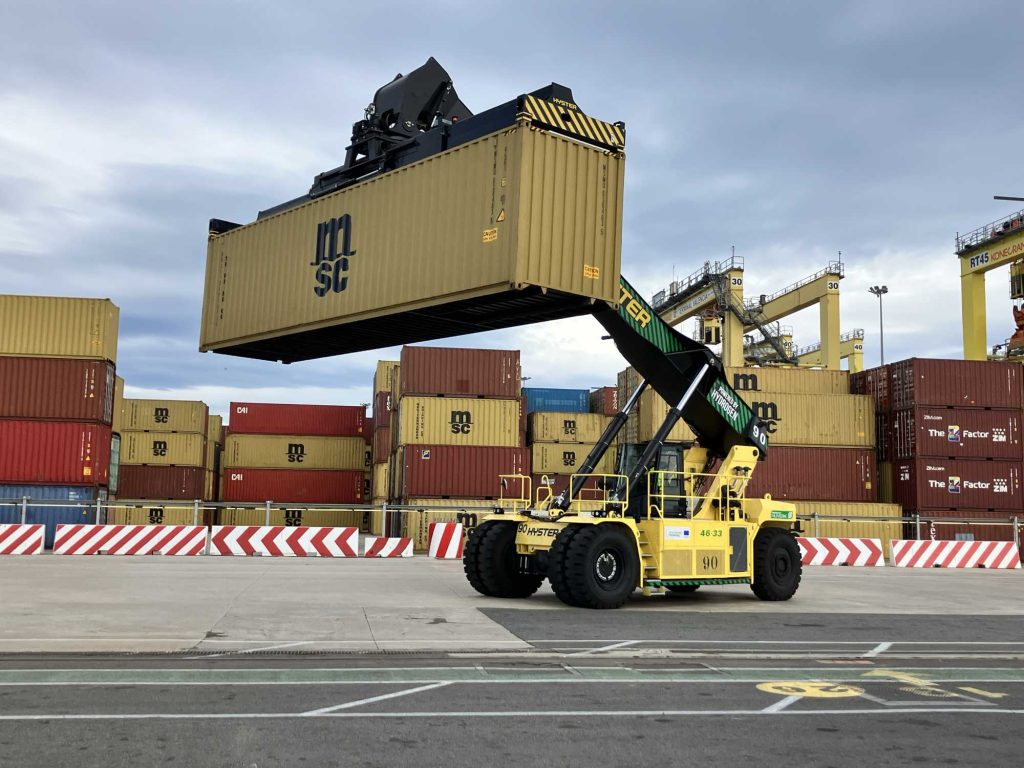Nuvera Fuel Cells, LLC is a global provider of efficient and reliable zero-emission power solutions for on- and off-road vehicles, port equipment, stationary power and maritime applications.
Interview with Santiago Bresani, Business Development and Sales Leader – Europe at Nuvera Fuel Cells, LLC.
A brief description of the company and its activities.
Santiago Bresani: Nuvera Fuel Cells, LLC has been developing fuel cell technology for more than 25 years and today offers high-efficiency fuel cell engines for commercial and heavy-duty applications based on our proprietary fuel cell stack technology. Nuvera is a subsidiary of Hyster-Yale Materials Handling, Inc., the operating company of publicly listed Hyster-Yale, Inc. (NYSE: HY), and is headquartered in Billerica, Massachusetts. With offices in Italy, the Netherlands, China, and India, Nuvera is well-positioned to provide zero-emission hydrogen solutions for customer needs worldwide.
What are the main areas of activity of the company?
S.B: As a global leader of efficient and reliable zero-emission power systems for on- and off-road vehicles, port equipment, stationary power, materials handling, and maritime applications, Nuvera’s high-efficiency power systems optimize hydrogen usage and provide a fast-fueled alternative to battery-only electric vehicles. We work closely with customers to successfully integrate fuel cells into their motive, portable and stationary applications and maximize opportunities associated with transitioning to hydrogen fuel cell technology and achieving rapid progress to meet zero-emission goals and mandates.
The companies we engage with are primarily system integrators and OEMs. Since the fuel cell industry is still nascent and growing, a significant part of our job is to engage with companies, such as component suppliers, that help turn our engines into zero-emission solutions and expedite the transition to zero emissions.

What’s the news about new products/services?
S.B: We recently announced a memorandum of understanding with Viritech Limited, a United Kingdom-based developer of hydrogen powertrain solutions for the automotive, aerospace, marine and distributed power sectors. Nuvera will supply its E-Series Fuel Cell Engines for testing of integration with Viritech’s powertrain product line for on-road commercial vehicles.
Viritech has previously integrated Nuvera’s E-60 engine into a hydrogen fuel cell-powered racecar, and the mule vehicle is currently operational and has successfully undergone demonstrations. It will be showcased to the European market during September’s LCV Cenex trade show in the United Kingdom.
Other recent noteworthy projects include a fuel cell-powered boat in Europe, and a mobile genset and electric vehicle charger that was showcased at the ACT Expo in Las Vegas this past May.
What are the ranges of products/services?
S.B: Collaborating closely with our parent company and a diversified customer base worldwide, Nuvera is actively committed to reducing emissions across various impactful sectors, including on-road transportation, port equipment, maritime operations, and EV charging.
Nuvera’s projects encompass a wide range of equipment such as buses, wheel loaders, container handlers, reachstackers, mobile gensets, marine power packs, and more. Through rigorous testing and real-world demonstration projects, conducted both within controlled environments and in actual field operations, Nuvera and the industry are rapidly advancing toward meeting end-users’ and application requirements and zero-emission solution adoptions.
What is the state of the market where you are currently active?
S.B: As we approach imminent emission reduction mandates, the search for readily available, scalable technologies that align with customers’ operational and economic needs has reached a critical juncture. The transition toward large-scale zero-emission electrification is gaining momentum, marked by a continuous stream of new product and project announcements. However, it is crucial to ground this progress in reality and chart a clear roadmap toward practical zero-emission solutions for commercial fleets.
In the last year, European markets embraced a transformative realization: the journey towards establishing a sustainable and economically viable green hydrogen infrastructure will require more time than anticipated. Rather than viewing this as a setback, it has sparked a constructive re-evaluation of priorities. Truck and road transportation fleets had been seen as the initial markets for fuel cell adoption, but when this deployment was postponed, it opened the opportunity to shift focus to explore other untapped avenues of business development.
This shift served as a catalyst for innovation, prompting companies to diversify their strategies and explore alternative markets. This fresh perspective not only mitigated the impact on companies that were overly reliant on traditional markets, it also unveiled new horizons, particularly in stationary power and maritime applications, where fuel cells could revolutionize industries and drive sustainable progress.

What can you tell us about market trends?
S.B: Although the process for successful fuel cell implementation is necessarily specific to each customer’s application, access to clean hydrogen at a competitive price is a widespread challenge. Fortunately, there’s growing government support for hydrogen to enable the decarbonization of transportation and other industries, exemplified by the Hydrogen Hubs initiative in the United States and similar efforts globally to reduce costs by scaling up production. It is widely recognized that permitting for hydrogen facilities can take months or years, so there’s increased focus on overcoming those hurdles to rapid infrastructure expansion and vehicle deployments.
Regardless, the rapidly growing demand for zero-emission solutions has created opportunities and a platform for hydrogen fuel cell power solutions to address environmental concerns and showcase their efficiency and reliability advantages across many sectors.
While the pricing and life of the products remain important considerations for customers, reliability emerges as an essential factor in their adoption journey. Customers seek a dependable system supplier who provides seamless integration and ongoing support. Moreover, given the high cost of hydrogen, system efficiency plays a pivotal role in selecting fuel cell suppliers.
What are the most innovative products/services marketed?
S.B: A milestone for us was the delivery of a Nuvera-powered hydrogen fuel cell container handler developed by our parent company to the Port of Valencia in Spain. It is currently in operation at the MSC container terminal, one of the largest in Europe. In addition, a Nuvera-powered hydrogen fuel cell electric terminal tractor is being put to work at the HHLA Container Terminal Tollerort in Hamburg, Germany. We also previously demonstrated the world’s first five-ton fuel cell wheel loader at a customer’s site in China.
In the marine sector, we announced a formal technology agreement with HELINOR Energy to develop maritime power solutions and, as a participant in the European Union-funded APOLO project, we’re providing a EN-125 engine to operate on hydrogen derived from ammonia, which is emerging as a key zero-carbon fuel in the maritime sector that can be produced renewably.

What estimations do you have for 2024?
S.B: As hydrogen’s momentum continues to accelerate, we are excited about numerous upcoming projects, including the EN-125 Fuel Cell Engine, Nuvera’s first power product incorporating its next-generation fuel cell stack. This cutting-edge technology delivers high efficiency and unprecedented power density in our highest power fuel cell engine yet. Nuvera will remain dedicated to listening to our customers to continuously improve and deliver even more reliable products. Our goal is to expand our network of partners and clients across all applications to demonstrate the capabilities of our systems.
While the fuel cell market is progressing slower than anticipated in achieving the necessary scale, we remain confident that this technology will play a major role in the critical job of decarbonizing our economy. Fuel cell technology stands out as a vital solution enabling heavy-duty applications to achieve true zero emissions, while also improving energy efficiency through system electrification. This emphasizes the importance of gaining experience with the technology now so that when the time is right, companies can fully capitalize on its potential.

